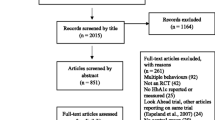Abstract
Although the term “behavioral epidemiology” has been used in the literature since the late 1970s, it has not been clearly defined. A behavioral epidemiology framework is proposed to specify a systematic sequence of studies on health-related behaviors, leading to evidence-based interventions directed at populations. The phases are: 1—establish links between behaviors and health; 2—develop measures of the behavior; 3—identify influences on the behavior; 4—evaluate interventions to change the behavior; 5—translate research into practice. Mature research areas are expected to have more studies in the latter phases. Recent volumes of four journals (Annals of Behavioral Medicine, Health Psychology, Journal of Nutrition Education, Tobacco Control) were audited, and empirical studies were classified into these phases. Phase 3 studies were common (identifying influences on behaviors; 27% to 50%), and Phase 2 studies were least common (measurement; 0% to 15%).Annals of Behavioral Medicine andHealth Psychology were low on Phase 4 (intervention studies; 9% and 11%, respectively). TheJournal of Nutrition Education was the only journal reviewed that had a substantial number (20%) of Phase 5 studies (translating research into practice). The behavioral epidemiology framework can be used to evaluate the status of research on health behaviors and to guide research policies.
Similar content being viewed by others
References
McGinnis JM, Foege WH: Actual causes of death in the U.S.Journal of the American Medical Association. 1993,270:2207–2212.
Rose G:The Strategy of Preventive Medicine. Oxford, England: Oxford University Press, 1992.
Kaplan RM: Behavioral epidemiology, health promotion, and health services.Medical Care. 1985,23:564–583.
Kaplan RM, Criqui MH:Behavioral Epidemiology and Disease Prevention. New York: Plenum, 1985.
Owen N: Behavioral epidemiology research and intervention studies to improve smoking cessation services.Health Education Research. 1989,4:145–153.
Raymond JS: Behavioral epidemiology: The science of health promotion.Health Promotion International. 1989,4:281–286.
Sexton MM: Behavioral epidemiology. In Pomerleau OF, Brady JP (eds),Behavioral Medicine: Theory and Practice. Baltimore, MD: Williams and Wilkins, 1979, 3–21.
Sallis JF, Owen N:Physical Activity and Behavioral Medicine. Thousand Oaks, CA: Sage, 1999.
Greenwald P, Cullen JW: The new emphasis in cancer control.Journal of the National Cancer Institute. 1985,74:543–551.
Flay BR: Efficacy and effectiveness trials (and other phases of research) in the development of health promotion programs.Preventive Medicine. 1986,15:451–474.
Oldenburg B, Hardcastle D, Kok G: Diffusion of health education and health promotion innovations. In Glanz K, Lewis FM, Rimer BK (eds),Health Behavior and Health Education: Theory, Research, and Practice (2nd Ed.). San Francisco, CA: Jossey-Bass, 1997, 270–286.
Green LW, Kreuter MW:Health Promotion Planning: An Educational and Environmental Approach. Mountain View, CA: Mayfield, 1990.
Winett RA, King AC, Altman DG:Health Psychology and Public Health: An Integrative Approach. New York: Pergamon, 1989.
Fotheringham MJ, Owen N: Applying psychological theories to promoting healthy lifestyles. In Rippe JM (ed),Lifestyle Medicine. Shrewsbury, MA: Blackwell, 1999, 501–510.
Glanz K, Lewis FM, Rimer BK (eds):Health Behavior and Health Education: Theory, Research, and Practice (2nd Ed.). San Francisco, CA: Jossey-Bass, 1997.
Baranowski T, Lin LS, Wetter DW, Resnicow K, Hearn MD: Theory as mediating variables: Why aren’t community interventions working as desired?.Annals of Epidemiology. 1997,7(Suppl.):S89-S95.
Oldenburg B, Sallis JF, Ffrench ML, Owen N: Health promotion research and the diffusion and institutionalization of interventions.Health Education Research. 1999,14:121–130.
Skinner BF:Science and Human Behavior. New York: Macmillan, 1953.
Baranowski T, Perry CL, Parcel GS: How individuals, environments, and health behavior interact: Social cognitive theory. In Glanz K, Lewis FM, Rimer BK (eds),Health Behavior and Health Education: Theory, Research, and Practice (2nd Ed.). San Francisco, CA: Jossey-Bass, 1997, 153–178.
Owen N, Lee C: Development of behaviorally-based policy guidelines for the promotion of exercise.Journal of Public Health Policy. 1989,10:43–61.
U.S. Department of Health and Human Services:Healthy People 2010. (Conference Edition). Washington, DC: U.S. Department of Health and Human Services, 2000.
Commonwealth Department of Human Services & Health:Better Health Outcomes for Australians. Canberra, Australia: Australian Government Publishing Service, 1994.
Kaplan RM: Behavior as the central outcome in health care.American Psychologist. 1990,45:1211–1220.
Last JM:A Dictionary of Epidemiology (3rd Ed.). Oxford, England: Oxford University Press, 1995.
Author information
Authors and Affiliations
Additional information
Adrian Bauman and Tom Baranowski contributed to the critique of terminology. Special thanks to Robert LaForge for his helpful comments on an earlier draft. Kecia Carrasco contributed to manuscript preparation.
About this article
Cite this article
Sallis, J.F., Owen, N. & Fotheringham, M.J. Behavioral epidemiology: A systematic framework to classify phases of research on health promotion and disease prevention. Ann Behav Med 22, 294–298 (2000). https://doi.org/10.1007/BF02895665
Published:
Issue Date:
DOI: https://doi.org/10.1007/BF02895665




